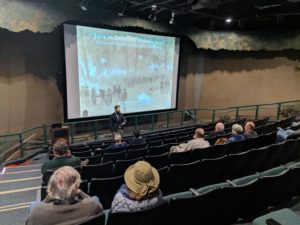Pedagogical Philosophy
As an educator, I base my historical teaching on a pedagogical philosophy grounded in a model of progressive instruction, guided discussion, and facilitated exploration of the past. First and foremost, I strive to inspire every student to think of history as a rigorous evidence-based quest to develop and hone explanations for why the present is the way it is, and not some other way. I encourage students to think of historical narratives as tools with which to consider and better understand the world around them in a way that can empower the pursuit of whatever ambitions they entertain. Finally, I employ vivid case studies, Socratic dialogue, debates, and independent research assignments to sharpen student critical thinking and self-expression skills.
I sincerely believe that any study of history must necessarily begin with a survey of what aspects, problems, or challenges of either the present or some period in time after the historical era under examination compel each student. Forays into the past ought to always be guided by organizing questions, provided either by the instructor or the students themselves. I inaugurate each semester with a class discussion about what questions my students have about the subject matter at hand and subsequently employ that feedback to better structure my lectures and class discussions to highlight how engagement with the past can assist in offering answers to those questions. In this way, their understanding of history as a discipline is enlarged from merely a set of interesting case studies to be memorized to a way of thinking about and understanding problems and situations they encounter in the world around them.
In order to be truly successful at enlarging the knowledge of any student, the instructor must begin by identifying what knowledge a pupil already maintains. I subscribe to a model of progressive instruction which establishes connections between what a student already knows and the subject matter they need to know in order to ask ever more compelling questions of their own design that ultimately carry their knowledge in inspiring directions. Often, students require foundational knowledge of the kind provided in an encyclopedia, textbook, or overview lecture that assists them in associating the material to be learned with that which they have mastered in other courses or readings. Only then can more focused lectures, monographs, or, most importantly, primary sources, be fruitfully engaged with in a meaningful way.
Through class discussions, Socratic dialogue, and active learning activities like small group debates, the material covered by lectures and more focused readings is critically considered, scrutinized, and ultimately synthesized in an ever-evolving assimilation of new knowledge. The student is ultimately required to employ this knowledge in making an argument informed by independent historical research of their own. Their success is in part contingent upon my mentorship in identifying and interrogating primary and secondary sources and in helping to refine their reading and writing skills. Finally, the student culminates the semester with a display of their mastery of the material in a final examination and their historiographical competence through the composition of a piece of original historical research.
To be sure, I emphatically do not approach historical education merely as an exercise in transmitting knowledge about the past from instructor to student. The project of learning is a mutual enterprise, wherein my own understanding of the past is greatly enlarged by the opportunity of witnessing students harnessing their own unique perspectives to direct our journey. Realizing the full benefit accruing to the sheer diversity of those perspectives makes the consistent cultivation of a safe environment for free self-expression and often contentious debate crucial to success. Moreover, I encourage students to continually sharpen their skills in critical thinking by challenging both me and the readings when they feel they can muster an evidence-based argument.
Course Syllabi
Global History of Warfare (Online)
National and International Security
Teaching Experience
Instructor, Global History of Warfare (Online)
UNC Chapel Hill, Summer Session II, 2019
Instructor, National and International Security,
UNC Chapel Hill, Fall 2018-19
Assistant Teacher, American History to 1865
UNC Chapel Hill, Dr. Harry L. Watson, Fall 2014-15
Assistant Teacher, North Carolina History to 1865
UNC Chapel Hill, Dr. Harry L. Watson, Spring 2014-15
Graduate Instructor, American History to 1865
UNC Chapel Hill, Dr. Joseph T. Glatthaar, Fall 2015-16
Graduate Instructor, American History to 1865
UNC Chapel Hill, Dr. Kathleen DuVal, Spring 2015-16
Grading Assistant, History of Air Power
UNC Chapel Hill, Dr. Joseph Caddell, Fall 2016-17
Graduate Instructor, U.S. Military History
UNC Chapel Hill, Dr. Joseph T. Glatthaar, Spring 2016-17
Grading Assistant, National and International Security
UNC Chapel Hill, Dr. Navin Bapat, Fall 2017-18
Teaching Assistant, Global History of Warfare
UNC Chapel Hill, Dr. Wayne Lee, Spring 2017-18
